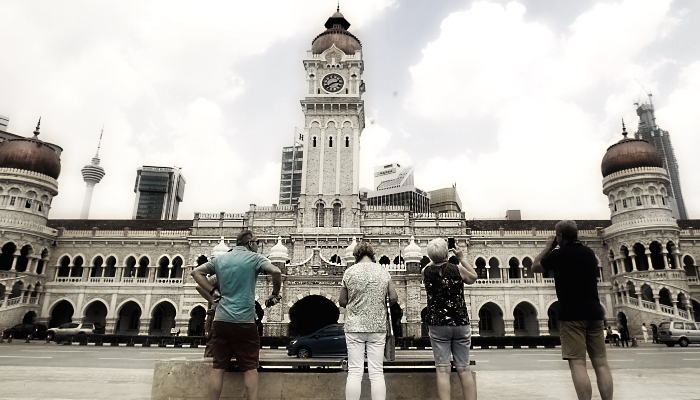Sin Chew Daily
2020 is supposed to be Visit Malaysia Year with a goal of RM100 billion in tourist receipts from 30 million international visitors.
Unfortunately such a "perfect plan" has been completely disrupted by the coronavirus.
Tourism, arts and culture minister Nancy Shukri said last month the entire tourist industry will suffer losses in excess of RM100 billion this year, with tourist arrivals down to only 4.2 million or 14% of initial projection.
The travel-related industry contributes about RM168.5 billion or 11.7% to the national economy. Due to severe slump in the industry, AirAsia X finds itself heavily in debt and is facing possible liquidation, while the government is in talks with Khazanah to settle MAS' financial woes.
32 travel agencies have closed down during the first ten months of this year, along with numerous hotels, restaurants, etc, sending many out of work.
Although prime minister Muhyiddin Yassin has announced up to RM1,000 income tax relief for domestic travel expenses until December 31 next year, this initiative is of little help to the struggling travel industry.
The UN World Tourism Organization (UNWTO) and OECD have said the global travel business is expected to contract by 80% this year, the worst in almost seven decades, with an estimated industrial loss of US$4.7 trillion or 5.4% of the world's GDP, on top of 174 million jobs lost.
The global travel industry has been expanding steadily at annual rates of 4% to 6% between 2015 and 2019. The total number of tourists worldwide reached a high of 12.3 billion last year, spending a total of US$5.8 trillion. This year will see a drastic drop of 80% in tourist revenues.
It has been estimated that the travel industry will only begin to pick up again in the last quarter of 2021. If things go well, the industry may recover to 85% of 2019 level in 2022, and fully recover only in 2023. Perhaps we can expect to see the first spring of travel industry as early as Q1 2022 if the coronavirus vaccines work.
Allocation set aside for the industry in Budget 2021 is a meager RM1,140.45 million, which will only have minimal effects on the industry's recovery.
We must realize that the tourist industry makes up about 6.7% of the world's GDP of US$86.6 trillion, and is one thing nations across the world are fighting so hard to grab. Countries that first deliver themselves out of the coronavirus gloom will be the first to savor the sweet taste of tourist industry recovery. We cannot afford to wait until 2022.
What we want is fastest possible recovery of the industry, and the only way out is to effectively contain the spread of the virus.
As such, we should take a more proactive stance in pushing a nationwide vaccination program and strict adherence to the SOPs, with the hope we can put this whole pandemic behind us before the second quarter of next year.
We can only open our borders to countries that have successfully contained the virus, in what we call "travel bubble", if we ourselves manage to do the same. Tourist activities will only be boosted if foreign visitors are exempted from the 14-day quarantine. The "travel bubble" program has been kicked off between Australia and New Zealand, while that between Hong Kong and Singapore will start next month.
The dramatic surge in new cases in this country could be blamed on the Sabah state poll that shouldn't have been held in the first place, and lax SOP adherence among migrant worker communities. If we had flattened the curve earlier, we would have have been able to launch travel bubble programs with a host of countries such as Singapore, Hong Kong, Australia, New Zealand, China, Taiwan, Japan, Vietnam and Thailand. We could start from business travels and then gradually open up for commercial fairs, medical tourism, education, social visits, free independent travels (FIT) and group tours.
On December 9, Chancellor Angela Merkel made an emotional plea to the Germans at the Budestag to comply with the SOPs, not to have too much contact over Christmas and make it the "last Christmas with the grandparents".
Two days later, our senior minister of defense Ismail Sabri Yaakob relaxed the travel restrictions on low numbers of community infections despite staggering new daily infection numbers, saying it is impossible for the government to control movements at all times and that Malaysians should be more self-disciplined, citing the example of Taiwan.
Looks like this is all we can do. Hopefully we can be as disciplined as the Taiwanese and take the advice of Germany's Merkel so that we can successfully contain the virus and usher in the long-awaited spring of the travel industry.

ADVERTISEMENT
ADVERTISEMENT


































